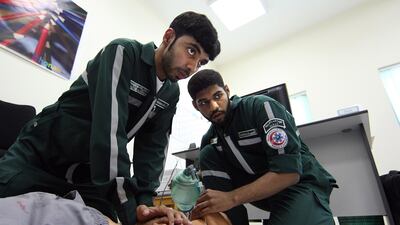Dubai will distribute 10,000 defibrillators across the city and train thousands of people in CPR with the aim of dramatically reducing death rates for sudden cardiac arrests.
At present, the global average survival rate for people who have sudden cardiac arrest and who are not in hospital is 5 to 10 per cent. The emirate seeks to increase the local survival rate to 65 per cent.
On Sunday, Dubai Health Authority signed an agreement with the American Heart Association to organise cardiopulmonary resuscitation training and distribute the defibrillators.
Dr Fahad Baslaib, consultant interventional cardiologist and chief executive of Rashid Hospital, said the authority was taking a three-pronged approach to improving survival rates. The first is to train as many volunteers as possible to administer CPR.
The second is to provide automated external defibrillators across the city. The third stage is the launch of a mobile app that will show its user where the nearest CPR-trained professional is and also the nearest defibrillator.
A defibrillator delivers an electric current to the heart and buys the patient survival time. Every second after a heart attack is crucial and medical help needs to reach the patient within four minutes.
Doctors previously told The National that people as young as 28 were having heart attacks in the UAE. The onset of cardiovascular disease is 10 years earlier here than in western countries.
Men and women in the US or Europe are considered at risk for heart attacks from between the ages of 50 and 60, but in the UAE, it is between 40 and 50.
Doctors said this was due to increased levels of smoking and diabetes in the country.
Authorities in Dubai are hoping to avoid fatal heart attacks with this initiative.
To date, more than 23,000 volunteers have been trained in CPR by affiliates of the American Heart Association.
“Excellent cardiac care should be the standard for everyone, said Zehra Al Hilali, Mena regional director of the American Heart Association. “By working together, we can create more scalable, lasting and impactful solutions.”

